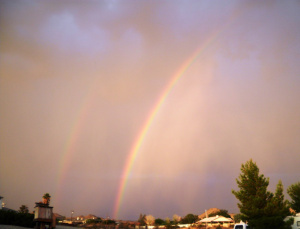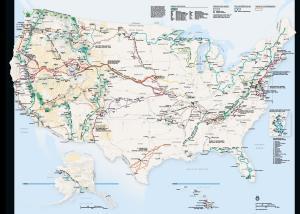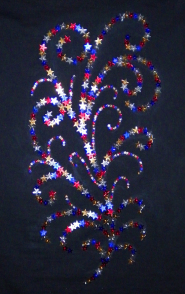Pat Bertram's Blog, page 174
April 24, 2015
The Magic of Blogging by Email
I’ve been practicing posting by email to make it easier to blog when my only access to the internet will be my phone. It wasn’t as difficult to post by email as I thought it would be.
The first thing I needed to do was to get a special email address. To do this, go to your dashboard and click on “my blogs.” The easiest way to find “my blogs” is to go to your blog, hover your cursor over “my site” on the left navigation strip, then click on “WP Admin.” You should see “My blogs” on the left sidebar close to the top.
 Click “enable email” for the blog you wish to post to via email. That will give you a special email address. I input the email address in my phone so I don’t have to ever think about it again, and now it’s ready whenever I need it.
Click “enable email” for the blog you wish to post to via email. That will give you a special email address. I input the email address in my phone so I don’t have to ever think about it again, and now it’s ready whenever I need it.
To post by email, go to your email on your phone and open a new message. The recipient, of course, is that secret email address WordPress assigned to you. The subject line is the title of the blog. The body of the email is the blog itself. An attached photo will show up on the bottom of the email. Apparently, as of now, there isn’t a way to align the image via email. If you want to realign it — to add it to the top of the blog or to wrap text around it — you have to edit the post on your computer.
There are some really cool aspects of email blogging, for example, the shortcodes. [category a,b,c] will post categories. The categories must already be ones you use on your blog. The brackets are part of the shortcode, and there can be no space before the word “category” or after the last category you use. (In this case, the letter c.) You don’t even have to use the whole word, just the first few letters, but I haven’t yet tried out that tip.
For tags, use the shortcode [tags a,b,c]. Again, no space before the word “tags” and after the last tag. Be sure to separate tags with commas. New tags will be automatically generated; they don’t already need to be in use on your blog.
If you attach more than one photo, they will show up as a gallery. If you want each one posted individually, use the shortcode [nogallery].
These three shortcodes can be placed anywhere in the email and it won’t affect the text of your post.
Magic!
***
Pat Bertram is the author of the suspense novels Light Bringer, More Deaths Than One, A Spark of Heavenly Fire, and Daughter Am I. Bertram is also the author of Grief: The Great Yearning, “an exquisite book, wrenching to read, and at the same time full of profound truths.” Connect with Pat on Google+. Like Pat on Facebook.
Tagged: adding tags to email posts, attaching image to email blog posts, blog by email, shortcodes, WordPress


January 5, 2015
Tears. Again.
If you���re sick of hearing about my sorrow, you can leave. I don���t mind. I���m sick of my grief and tears, too, but I���m stuck with them.
Ever since my father���s death two months ago, I���ve been in a strange state. Not only has his death brought back the memory of the death that devastated me (the death of Jeff, my life mate/soul mate), it���s set in motion a whole new set of changes in my life. I came to look after my father after Jeff died, and now that they are both gone, I have to look to my own life and figure out where I want to go and what I want to do.
Do you really think I want to walk the Pacific Crest Trail, live a nomadic life in some sort of camper/van, or any of the other things I blog about? Of course I don’t. But the one thing I do want — to go home to Jeff, the  only person who truly understood me — is forever denied me. And so I try��to find new wants, which isn���t easy because I���m not a person who wants. (I never wanted��anyone,��either,��but like a mythical being clothed in light, Jeff��appeared in my life one incredible Saturday morning in August thirty-eight years ago. And then, almost five years ago, he left to go back from wherever he came.)
only person who truly understood me — is forever denied me. And so I try��to find new wants, which isn���t easy because I���m not a person who wants. (I never wanted��anyone,��either,��but like a mythical being clothed in light, Jeff��appeared in my life one incredible Saturday morning in August thirty-eight years ago. And then, almost five years ago, he left to go back from wherever he came.)
I���m fine most of the time. Really, I am. But today, I was with friends watching a movie — Patrick Swayze���s The Last Dance — and one woman piped up, ���Divorce is so much worse than death.��� I���d heard her make that same stark remark many times before, but today, I couldn���t let it pass. I said, more sharply than I intended, ���You keep saying that, but it���s not necessarily true.��� She went on her normal spiel about how when someone is dead, they don���t keep coming back, and I again spoke sharply. ���Don���t you think I would give anything if Jeff came back? Your ex-husband has finally left you alone, but Jeff is still dead.��� Her response was her oft-repeated, ���But you didn���t have to deal with him rejecting you.���
I could have told her about the thousands of rejections one has to deal with when someone is dying, how they leave you every single day, how they have no time to think of you because their own concerns loom so large, how your heart breaks and breaks and breaks with the constant rejection until finally you don���t feel anything any more. I could have said a lot of things, but I wasn’t able to��continue the conversation. I���d started crying when I spoke the simple words, ���Jeff is dead,��� and I couldn���t stop.
I pulled myself together to take my leave after the movie, but I cried all the way home, and I���m crying still.
How is it possible that almost five years later, I can be pulled back to the pain of his dying so quickly? Sometimes I wish I were as stoic as I once thought I was — I presumed��I���d take his death in stride — but grief is more than simply feeling sad or rejected. It���s even more than those insipid 5 (or 7) stages of grief that everyone seems to believe in. Sure, we feel shock, denial, anger, guilt, sadness, depression, and acceptance, but most of us also feel anxiety, frustration, loneliness, confusion, despair, helplessness, panic, questioning (both as a need to know why and as a cry of pain), loss or gain of faith, loss of identity, loss of self-esteem, resentment, bitterness, isolation, inability to focus, suspended animation, waiting for we know not what, envy of those who are still coupled or who have yet to suffer a loss. And we suffer myriad physical symptoms such as queasiness, dizziness, sleep problems (too much or too little), eating problems (too much or too little), bone-deep pain, inability at times to breath or swallow, exhaustion, lack of energy, restlessness, and seemingly endless bouts of tears. (Yes, I know, those who get divorced also feel many of these things, and I empathize with them, but they do not have to deal with the angst of death, which adds a whole other layer of pain to the equation.)
My grief has mostly wound down since I’ve dealt with so many of��the various aspects of grief, but still, days like today remind me that I will never be over Jeff, never stop missing him. And so I try to be tolerant of other���s condescension, try to create new possibilities, try to want something enough to make a life out of it.
And yet, no matter what I do for the rest of my life, he will still be dead. Nothing will ever change that — not my thoughts of an��adventurous future and most certainly not my tears.
***
Pat Bertram��is the author of the suspense novels��Light Bringer,��More Deaths Than One,��A Spark of Heavenly Fire,��and��Daughter Am I.��Bertram is also the author of��Grief: The Great Yearning, ���an exquisite book, wrenching to read, and at the same time full of profound truths.��� Connect with��Pat on Google+. Like Pat on��Facebook.
Tagged: aspects of grief, death, death and rejection, death vs divorce, grief at five years, stages of grief, still dead

January 4, 2015
A Desert Revelation
Ideas of an epic adventure of my own seem unreal at times, and yet, in my researches, I���ve been coming across the blogs of many older women who have undergone great losses and great grief, and are now finding solo adventures in their latter years. Living in RVs, stealth camping, kayaking in all 50 states, thru-hiking various national trails, pumping iron. It���s as if once women have been set free from all ties, we become bold and adventurous, treating the whole world as our own back yard.
 Today, out walking in the desert, I had an interesting revelation. I was��thinking about these women and their great adventures, thinking about the possibility of my own adventure walking or living on the road. I was wondering which I should do first, get a van conversion or go walking, when it hit me — do both at once.
Today, out walking in the desert, I had an interesting revelation. I was��thinking about these women and their great adventures, thinking about the possibility of my own adventure walking or living on the road. I was wondering which I should do first, get a van conversion or go walking, when it hit me — do both at once.
I talk about thru-walking the Pacific Crest Trail, maybe walking across the United States, or some other epic walk, but such an athletic feat is beyond my strength and knowledge, at least for now. Even if there weren���t the problem of carrying enough water to get me through long dry sections, there is the greater problem that I don���t like backpacking. I do, however, like seeing the world at a walking pace of about 3 miles per hour.
I know people who would like an adventure but don���t have the financial or physical resources for an epic journey of their own. What if I got the van or camper, let these people use it, even paid for their expenses, and all they would have to do is meet me at the end of each day with my gear and supplies. The rest of the time, they could loll on the beach, enjoy the scenery from a mountaintop, maybe find the inspiration and the time to finally write again.
Meantime, I���d be just walking along, nothing in my mind but the next step, nothing in my pockets but enough water and food to get me to the rendezvous point.
I could even go to where such a willing volunteer��lived, and find somewhere to walk around that region.
And if I had extended periods between walks? Come back here and take dance classes, of course.
***
Pat Bertram��is the author of the suspense novels��Light Bringer,��More Deaths Than One,��A Spark of Heavenly Fire,��and��Daughter Am I.��Bertram is also the author of��Grief: The Great Yearning, ���an exquisite book, wrenching to read, and at the same time full of profound truths.��� Connect with��Pat on Google+. Like Pat on��Facebook.
Tagged: great grief, Pacific Crest Trail, solo adventures, van conversion, walking in the desert, women alone

January 3, 2015
Trying to Imagine a New Life
It���s amazing the convoluted paths one���s brain takes when one needs to start building a��new��life.
Technically, I suppose, it���s never possible to start anew��since we always drag ourselves and our experiences with us, but still, for me and others I have recently met, our old life has expired, become unworkable, or no longer exists. In my case, my shared life with my life mate/soul mate no longer exists. He no longer exists, at least not here on earth. I still have many of our shared belongings, but even if I wanted to, there is no way to retrace my steps. Not only that, my current life has expired. When my old life ceased to exist, I filled an interim niche looking after my nonagenarian father. And now he, too, is gone. Even if by some stroke of good luck (or bad) and I were allowed to stay here in my father���s house, it would not be workable because I simply would not have the resources to keep up such a huge place.
And so I am trying to imagine a new life.
I often think of living on foot, at least for a while. Although it seems physically impossible for me, I can���t get the idea out of my head. Could I? Would I? Should I? It���s possible that life itself would dictate my taking the massive first step. For example if my ancient VW were to break down in the middle of nowhere, I would need to start walking. And perhaps I would simply keep on walking.
 Or, my latest harebrained idea — a friend has broached the subject of my visiting Florida. A long shot, and only in the first stages of consideration, but my thoughts immediately glommed onto the idea of walking back across the USA��if the trip came to fruition. Supposedly, if one is going to make a cross-country trip on foot, east to west is best — probably because there are more resources in the east, such as close-flung towns and more water sources than in the dry west.
Or, my latest harebrained idea — a friend has broached the subject of my visiting Florida. A long shot, and only in the first stages of consideration, but my thoughts immediately glommed onto the idea of walking back across the USA��if the trip came to fruition. Supposedly, if one is going to make a cross-country trip on foot, east to west is best — probably because there are more resources in the east, such as close-flung towns and more water sources than in the dry west.
I would like to visit a friend in Louisiana, a very dear friend I have yet to meet. Could I walk to her house from deep in the Florida panhandle? There are roads, of course, mainly highways, but then I checked the national trails map, and oh, my. There is a Florida National Scenic Trail for hikers. (Click on the map, and then click again to zoom out if you’d like to see a higher resolution image.) ��The Florida National Scenic Trail is not finished, but there are connecting spurs via rail-to-trail paths and other such footpaths from completed section to completed section. (Rail-to-trail is a system of abandoned railroad tracks and rail beds that have been converted to various trails.) And so my mind spins wonderful possibilities as well as even more wonderful impossibilities.
I have been thinking about some sort of trek for so long, some day I will have to attempt . . .�� something. Even if I manage a single day and night, that would still be an adventure.
Meantime, I���m also considering the possibility of some sort of van conversion for an extended road trip. Should I buy something already outfitted like a mini camper? Should I get something inexpensive in case I end up hating the idea? (I���ve been researching renting such a camper van, and the cost for a year is more than the purchase price of a decent used model.) Or should I buy something that would also serve as a city vehicle, and just a throw a mattress in the back to start? Would I want to live in a van for any length of time? (That old Saturday Night Live sketch about living in a van down by the river comes to mind.) And if so, would I want to design and build my own interior as a couple of people have suggested?
I like the idea of living large in small spaces — there seem to be a growing trend to miniscule homes, 300 square feet or less. I considered such a house, even went so far as to check out the feasibility of building one myself, but to tow the finished product would require a stronger vehicle than I have or would want to have. Still, the idea of designing my own place based on my basic needs is an interesting concept. What do I need? A bed, of course. A computer and electricity to run it. Some sort of potty. Maybe cooking facilities, maybe not. Maybe a lovely and lovingly furnished interior, maybe not. Maybe a shower, maybe not. (Yeah, I know, “maybe” includes “maybe not” but I liked the alliteration and the emphasis.)
Some people who have chosen such a lifestyle have omitted bathing facilities from their tiny space, instead opting for a membership at a national health club where hot showers would be available. An interesting solution.
People caution me about planning too much. They keep telling me I have no idea what might happen, and that is true, so I am simply playing with these ideas. Maybe, contrary to my gut feeling, my father���s house won���t sell right away. Maybe someone will offer a suggestion that I fall in love with for my next step, something I didn���t imagine. Maybe . . . well, I did say I have no idea what might happen so it���s foolish to continue listing maybes.
But I will continue to wonder what it is I need from life, what it is I need for life.
***
Pat Bertram��is the author of the suspense novels��Light Bringer,��More Deaths Than One,��A Spark of Heavenly Fire,��and��Daughter Am I.��Bertram is also the author of��Grief: The Great Yearning, ���an exquisite book, wrenching to read, and at the same time full of profound truths.��� Connect with��Pat on Google+. Like Pat on��Facebook.
Tagged: building a new life, camper van, conversion van, Florida National Scenic Trail, hiking, small houses, walking across the USA

January 2, 2015
A Good Day
I woke this morning with no energy, no enthusiasm for anything, no ideas. I lay there dozing until long after the time I would ever admit to staying in bed. I finally dragged myself from the warmth to take a walk. Took more energy than it should have. In fact, when I sat to put on my shoes before I left, I just sat. And sat. Not thinking anything, not doing anything. Just sitting.
Eventually, I did make it out the door. It was a lovely day — blue skies, moderate temperatures, barely moving air currents. Due to other activities, I haven���t been out to the desert in two or three weeks, so it was nice reconnecting to that wild world. (Or as wild as land so close to a housing development ever gets.)
 As I walked, I found myself wondering what it would be like to simply continue walking, heading . . . wherever. And it dawned on me why the idea of an epic walk keeps nagging at me. I feel most myself when I am walking. To be honest, I���m not sure exactly what that means except perhaps that when I am walking, I want nothing else, need nothing else. The easy movement, the ever-so-slightly changing scenery, the present moment are all enticingly hypnotic.
As I walked, I found myself wondering what it would be like to simply continue walking, heading . . . wherever. And it dawned on me why the idea of an epic walk keeps nagging at me. I feel most myself when I am walking. To be honest, I���m not sure exactly what that means except perhaps that when I am walking, I want nothing else, need nothing else. The easy movement, the ever-so-slightly changing scenery, the present moment are all enticingly hypnotic.
I am not so na��ve as to believe that an epic walk would be as beguiling. There would be no shelter from the night or unpleasant weather, no home base, no ready source of water or food once I used up the small amount I carried. And yet. And yet . . . I���m sitting here smiling at the very idea.
I often express my worry about settling down — not just creating a nest for myself, but settling for less than I want. When I expressed that sentiment to a friend today, she first asked me what I wanted. I had no answer other than that I wanted to become enlightened, stronger, wiser, more courageous. She told me that I was too far on my path ever to settle even if I did settle, which is comforting. Life is a terrible thing to waste, and I want . . . I want . . . I want something I can���t even imagine.
Luckily for me, all I have to deal with is today. And today, I got out of bed. Went for a walk. Lived in the moment. And now I am writing.
As it turned out, despite the inauspicious beginning, this was a good day.
I hope your day was rewarding, too.
***
Pat Bertram��is the author of the suspense novels��Light Bringer,��More Deaths Than One,��A Spark of Heavenly Fire,��and��Daughter Am I.��Bertram is also the author of��Grief: The Great Yearning, ���an exquisite book, wrenching to read, and at the same time full of profound truths.��� Connect with��Pat on Google+. Like Pat on��Facebook.
Tagged: a good day, couldn't get out of bed, naive, settling, settling down, sitting, walking

January 1, 2015
Unimagined Possibilities
This new year will bring many changes to my life, though I have no idea what those changes will be. I will be leaving my father���s house, of course, but other than that, the future is blank. (Not bleak, just blank.)
The only thing I know is that I don���t want to settle down somewhere and stagnate. I realize that settling down does not necessarily bring stagnation, but in my case, I am afraid that entropy would win. (If you���re not familiar with entropy, my understanding is that entropy is the quantity of energy in a closed system that becomes disordered and unavailable to effect changes in the system, and so the system gradually degrades into chaos, or even worse, inertia.)
The  reduction to inertia is not inevitable. Some of the disordered energy can be allowed to escape, which reduces the amount of entropy, and new energy can be introduced. The problem is that when one lives alone, it takes a lot of energy to introduce new energy to the system. It���s so much easier just to go with the flow, and if you have no one to disrupt the flow as you do when you are living with someone, the flow is toward a decrease in available energy. At least for me and other introverts. Extroverts by their nature increase the energy in a system. It���s what makes them extroverts. (The strange irony here seems to be that although introverts prefer to be alone, they need a shared life much more than extroverts.)
reduction to inertia is not inevitable. Some of the disordered energy can be allowed to escape, which reduces the amount of entropy, and new energy can be introduced. The problem is that when one lives alone, it takes a lot of energy to introduce new energy to the system. It���s so much easier just to go with the flow, and if you have no one to disrupt the flow as you do when you are living with someone, the flow is toward a decrease in available energy. At least for me and other introverts. Extroverts by their nature increase the energy in a system. It���s what makes them extroverts. (The strange irony here seems to be that although introverts prefer to be alone, they need a shared life much more than extroverts.)
At the beginning of a settled life, I would do things, of course, but as time passed, I would become entrenched in my habits, would get tired of the same sights, the same errands, the same . . . everything. And my world would shrink and continue shrinking until I became the crazy cat lady sans cats.
Such a shrinking is natural. Bruce Chatwin understood our heritage as nomads and explained the necessity for keeping on the move, especially by foot. Chatwin wrote:
Some American brain specialists took encephalogram readings of travellers. They found that changes of scenery and awareness of the passage of seasons through the year stimulated the rhythms of the brain, contributing to a sense of well being and an active purpose in life. Monotonous surroundings and tedious regular activities wove patterns which produce fatigue, nervous disorders, apathy, self disgust and violent reactions.
Chatwin goes on to say: We should follow the Chinese poet Li Po in ���the hardships of travel and the many branchings of the way���. For life is a journey through wilderness. This concept, universal to the point of banality, could not have survived unless it was biologically true. None of our revolutionary heroes is worth a thing until he has been on a good walk. Che Guevara spoke of the ���nomadic phase��� of the Cuban Revolution. Look what the Long March did for Mao Tse Tung, or Exodus for Moses.
I do not know if I have the physical capacity for walking long distances carrying a heavy pack. (Hmm. Maybe I could hire a Sherpa. Are there Sherpas for hire here in the USA?) I have no interest in being a revolutionary hero or a spiritual leader, but I do want, need . . . more. More than stagnation. More than simply enduring the coming years. More than any life I can imagine.
If in fact, we do live in the closed system of our lives, perhaps it is possible to poke holes in that system to let in more light. Perhaps it is possible to gently push back the boundaries of that system to allow for greater breadth or let new experiences create greater depth.
Perhaps it is possible to . . .
The thought of how that��italicized��sentence might end fuels my new year.
Wishing you a year of yet unimagined possibilities.
***
Pat Bertram��is the author of the suspense novels��Light Bringer,��More Deaths Than One,��A Spark of Heavenly Fire,��and��Daughter Am I.��Bertram is also the author of��Grief: The Great Yearning, ���an exquisite book, wrenching to read, and at the same time full of profound truths.��� Connect with��Pat on Google+. Like Pat on��Facebook.
Tagged: Bruce Chatwin, chaos, entropy, journey through wilderness, nomads, revolutionary heroes, unimagined possibilities

December 31, 2014
The Extraordinariness of Ordinary Things
I���ve been invited to a New Year���s Eve party — nothing fancy, just pizza, salad, boxed wine, and sparkling cider. I���m looking forward to it with all the expectation as if it were a fancy dress ball because this will be my very first New Year���s Eve party. Even as I write these words, it doesn���t seem possible, but it���s true. In my entire life, I have never been to a New Year���s Eve party.
 New Year���s doesn���t meant that much to me. It���s a relatively arbitrary date, and mostly signifies nothing but a new calendar, which, I suppose, is something to celebrate. My new calendar has 365 blank squares, and there is the question of how I will use those squares. With notations of appointments and special days, of course. Perhaps with reminders of bills to pay and chores to do. But many of those squares will be blank. What will I do with those blank days? I can���t even begin to guess.
New Year���s doesn���t meant that much to me. It���s a relatively arbitrary date, and mostly signifies nothing but a new calendar, which, I suppose, is something to celebrate. My new calendar has 365 blank squares, and there is the question of how I will use those squares. With notations of appointments and special days, of course. Perhaps with reminders of bills to pay and chores to do. But many of those squares will be blank. What will I do with those blank days? I can���t even begin to guess.
I know I will be leaving my father���s house, which has been both a place of refuge in my grief and a place of horror because of my schizophrenic brother and dying father. Although I have been thinking of this leaving for several years now, I still haven���t a clue what to do with my freedom. How does one choose where to go or what to do when there is no particular reason to be anywhere, no particular reason to do anything? (Well, there are dance classes here, and good friends, so those are important considerations, but I do not want to settle down, not here, not anywhere.)
But all that is yet to come. This is the last day of the old calendar, and for the first time ever I have the square filled in. New Year���s Eve party. 6:00pm.
Not only have I never gone to a New Year’s Eve party, I���ve seldom even stayed up to midnight to usher in the New Year, though for the past few years, ever since the death of my life mate/soul mate, I���ve made a point of toasting the brand new year with a crystal goblet of sparkling cider as a symbol of my commitment to living a full life.
Despite all my devastating losses, I am living fully. Well, partying fully, anyway. I���ve never gone to so many parties in such as short time as I did these past few weeks. Thanksgiving dinner, birthday party, pizza/taco party, Christmas party, Christmas Eve party, Christmas dinner, luncheon, three tea parties (those three I hosted).
And now a New Year���s Eve party.
It���s ironic when I think of it. I���ve spent the past couple of years dreaming of exotic and impossible adventures (impossible because they are beyond my physical capacities) in the hopes of finding transcendence or at least a new way of looking at life. Maybe, for me, transcendence will be found in the ordinary. My life has been counter to most people���s lives. I���ve lived a life of the heart and mind — loving profoundly, grieving deeply, reading profusely, thinking enormously — that the ordinary��everyone else takes for granted is, for me . . . truly extraordinary.
Wishing you an extraordinary New Year���s Eve.
***
Pat Bertram��is the author of the suspense novels��Light Bringer,��More Deaths Than One,��A Spark of Heavenly Fire,��and��Daughter Am I.��Bertram is also the author of��Grief: The Great Yearning, ���an exquisite book, wrenching to read, and at the same time full of profound truths.��� Connect with��Pat on Google+. Like Pat on��Facebook.
Tagged: new calendar, new year, New Year's Eve party, New Year���s Eve, ordinary things

December 30, 2014
Here���s To a Life Of Insecurity, Uncertainty, Failure
Yesterday was a wonderful day. Not only did I have two separate and delicious get-togethers with good friends, I felt no sadness, no tears, no angst when I was alone again.
I seem to have turned a corner — maybe not with the sadness, because sadness seems to be a constant underlying theme of my life even when I am otherwise happy, but with the angst. At the moment, I feel good. Unconflicted. Accepting. Though to be honest, I don���t know what it is I am accepting. Maybe that uncertainty is an acceptable way of life — because, truly, any certainty we feel is a matter of hope over reality. That the unusual doesn���t usually happen helps fuel the fantasy of certainty, but anything can happen to any of us at any time.
A friend sent me the following text: So here���s to a life of insecurity, uncertainty, failure, and most of all adventure. And oh, that sounds so strangely wonderful! We tend to think that security, certainty, and success are all things to be sought after, but what if they aren���t? What if security lies in uncertainty and failure? What if certainty lies in failure and insecurity? What if success lies in failure, uncertainty, and insecurity?
I don���t know what suc cess is since it remains elusive. I don���t know what failure is, either, though I have suffered too much of it. Still, success sometimes brings unrealistic expectations, forces us into a role we aren���t comfortable with, or steals time from loved ones, and aren���t those all failures? Failure often brings knowledge of a sort, and isn���t truth a success?
cess is since it remains elusive. I don���t know what failure is, either, though I have suffered too much of it. Still, success sometimes brings unrealistic expectations, forces us into a role we aren���t comfortable with, or steals time from loved ones, and aren���t those all failures? Failure often brings knowledge of a sort, and isn���t truth a success?
Truth has always excited me, though the keys to life���s mysteries — life���s truths — seem out of reach. Each truth learned hints at greater truths, and so we truth seekers are always seeking. (Always failing, too, because truth can never be grasped.)
Although I miss my soul mate with all my mind and heart, when I am brutally honest with myself, I know we went as far as we could together in our search for truth. For us to have remained together would have stifled that glow of barely sensed knowledge, would have kept us tethered to ordinariness. But by his death, he took me to the ends of my reach, showed me emotions I didn���t know existed, let me feel the bonds of eternity and the bounds of the earth.
I sense something more for me in this life, sense . . . whatever it is that lies beyond the cone of my vision. I haven���t a clue how to move beyond my own grasp, though I sense that a life of security, certainty and success is not the way to do it. All of those are ties that bind, and since I am free and boundless for the first time in my life, I���m not about to tie myself in knots again, at least until life and age do it for me.
Sometimes I sense laughter deep within the universe. Sometimes I sense the playfulness that holds everything together.
Once a very long time ago when I was immeasurably young, my classmates were trying to read each other���s minds. They sat there, brows furrowed in concentration. My then best friend was one of the would-be-mind readers. I was bored with the whole thing, and played my own game of trying to break their concentration by shouting out gleefully anything I could think of. The gameplayers were so annoyed at me they blocked me out, so no one realized that I unwittingly shouted out the right answers whenever my friend was the one sending the thoughts.
So playfulness, laughter, uncertainty, insecurity — these are things to be gleefully and joyfully embraced. Oddly, I don���t know how to play, to be playful. Never did. I was a serious child, and except for moments here and there, I���m a serious adult. But seriousness will never get me what I want. Truth is a shy creature that can���t be hunted, only enticed with promises of play.
I���m being foolishly poetic, perhaps, but maybe, just maybe, I���m on to something. If nothing else, maybe I���ll learn to be playful.
***
Pat Bertram is the author of the suspense novels Light Bringer, More Deaths Than One, A Spark of Heavenly Fire, andDaughter Am I. Bertram is also the author of Grief: The Great Yearning, ���an exquisite book, wrenching to read, and at the same time full of profound truths.��� Connect with Pat on Google+. Like Pat on Facebook.
Tagged: Failure, insecurity, laughter in the universe, playfulness, truth-seeker, uncertainty, what is truth

December 29, 2014
Channeling My Mother
I���ve been channeling my mother the past couple of days. Not channeling her in the s��ance sense, just in the sense that I have been doing what I so often saw her doing, and so I feel the continuation of her life.
My mother���s parents came from Poland. It was a shock to me when I realized as an adult that my mother was a first generation American who grew up speaking a language other than English. I always knew that, of course, but as a child you accept your mother for who she is without seeing her in the  broader context of life. We often think of first generation Americans as people who have a rough time speaking English (or who speak rough English), but she spoke impeccable English with no hint of that other language in her voice.
broader context of life. We often think of first generation Americans as people who have a rough time speaking English (or who speak rough English), but she spoke impeccable English with no hint of that other language in her voice.
Two things she did carry��over from her heritage, the Christmas wafer and pirogi. The tradition of the Christmas wafer dates back to the tenth century, and is a celebration of family. In our family, on Christmas Eve, each person got a small rectangular white wafer, paper thin and flavorless. We would hold out our wafer to each in turn, wishing each other Merry Christmas. Each person broke off a piece of the proffered wafer, ate it, then offered theirs in return. This custom in our family ended with the deaths of my mother and her sister.
We children never really appreciated the custom of the Christmas wafer, but pirogi. Now that is a different matter, and much appreciated. I make them once in a great while. A childhood favorite, it reminds me of . . . well, good food, good times, even warmth maybe. A few days ago, I had sampled some pirogi that were indifferent at best, which gave me a craving for my mother���s pirogi, so I went out and purchased the few simple ingredients. As I cut squares of thinly rolled dough, dropped a handful of a potato/cheese mixture into the center and pinched the edges, I could almost feel the shadow of my mother doing the same thing.
I must have made these treats with my mother a hundred times, but it wasn���t until now that I wondered what impelled her to make them when she did. Was it a yen for the connection with her mother? A desire for a taste of home? Perhaps, like me, she simply wanted the treat, or maybe she knew we did. I���ll never know, of course. She is beyond such questions, but it was nice visiting with her if only through memory.
This is the recipe she gave me when I left home:
6 cups flour
4 eggs
1 t salt
milk
6 or 8 large potatoes; boil till soft; mash with 1/2 lb longhorn cheese, salt, pepper paprika.
Roll dough thin, fill, boil, fry.
Not exactly the sort of recipe a neophyte can follow, but it makes perfect sense to me.
If you���re in the area and want a sample, leave a message here or give me a call. I���ll be delighted to have you come for tea and a pirogi or two. I have plenty.
***
Pat Bertram is the author of the suspense novels Light Bringer, More Deaths Than One, A Spark of Heavenly Fire, and Daughter Am I. Bertram is also the author of Grief: The Great Yearning, ���an exquisite book, wrenching to read, and at the same time full of profound truths.��� Connect with Pat on Google+. Like Pat onFacebook.
Tagged: Christmas wafer, cooking with my mother, pirogi, Polish mother, potato and cheese pirogi

December 28, 2014
This Thing Called Communication
Whenever I start patting myself on the back for my ability to write, something happens to make me realize how very difficult is this thing called communication.
Today I texted someone to give my opinion about a course of action he was planning to take that would affect me. I immediately received a call from him chastising me for my anger. I was taken aback because I wasn���t angry. I was being direct, or at least thought I was.
 I got upset with the situation, and remarked this was always happening to me — I say something that seems unadorned and direct, and the recipient reads it as anger. My communicant today responded, ���If it always happens, maybe the problem is with you.���
I got upset with the situation, and remarked this was always happening to me — I say something that seems unadorned and direct, and the recipient reads it as anger. My communicant today responded, ���If it always happens, maybe the problem is with you.���
Perhaps it is. If so, how would I know? I only know what it is I think I am saying, not what it is people hear when they read my words. But come to think of it, even if I were angry, what difference does it make? I���m allowed my own reaction, especially when it comes to things that affect me.
Today, because of his call, we were able to smooth things over. Both of us apologized for the misunderstanding, but that ease of voice-to-voice communication is not always possible. And when that happens, things drag on, with the situation getting ever more complicated. I try to explain myself in subsequent emails but end up only deepening the misunderstanding, because each explanation seems as if I���m refueling the anger.
When we write fiction, we write to evoke emotions — anger, nostalgia, humor — but people don���t always respond the way we want them to. Sometimes the humor falls flat, the romance seems uninspired, the pathos insipid, but we as writers don���t end up in imbroglios because of the miscommunication. In fact, we seldom even know where it is we lost those particular readers, or if they even care. Maybe they felt something completely different and just as meaningful as what we intended.
But real life isn���t as easy. We leave people with impressions we don���t want to make, and no matter how precise we think we���re being, we end up causing confusion. Case in point: I sent this text to the executor of my father���s estate: ���I���ve got a note on the cable box that it has to be returned to the company.��� And I do have a note taped to the box. I put it there as a reminder to return the box when the house is sold. I just wanted to make sure it didn���t get forgotten or thrown out in the flurry of post-sale activity. But the executor thought I meant that I received��a note from the cable company about the box. Eek.
Considering all the misinterpretations that are possible as words slip from one mind to another, it���s amazing that we can communicate at all.
***
Pat Bertram��is the author of the suspense novels��Light Bringer,��More Deaths Than One,��A Spark of Heavenly Fire,��and��Daughter Am I.��Bertram is also the author of��Grief: The Great Yearning, ���an exquisite book, wrenching to read, and at the same time full of profound truths.��� Connect with��Pat on Google+. Like Pat on��Facebook.
Tagged: cable box, communication, evoking emotions, misinterpretations, misunderstanding, misunderstanding texts, texting




